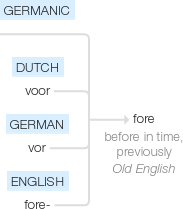Fore
Old English (as a preposition, also in the sense ‘before in time, previously’): of Germanic origin; related to Dutch voor and German vor . The adjective and noun represent the prefix fore- used independently (late 15th century).
wiktionary
A development of the prefix fore-.
etymonline
fore (adv., prep.)
Old English fore (prep.) "before, in front of, in presence of; because of, for the sake of; earlier in time; instead of;" as an adverb, "before, previously, formerly, once," from Proto-Germanic *fura "before" (source also of Old Saxon fora, Old Frisian fara, Old High German fora, German vor, Danish for, Old Norse fyrr, Gothic faiura "for"), from PIE *prae-, extended form of root *per- (1) "forward," hence "in front of, before."
Now displaced by before. In nautical use, "toward the bows of the ship." Merged from 13c. with the abbreviated forms of afore and before and thus formerly often written 'fore. As a noun, "the front," from 1630s. The warning cry in golf is first recorded 1878, probably a contraction of before.
fore (adj.)
mid-15c., "forward;" late 15c., "former, earlier;" early 16c., "situated at the front;" all senses apparently from fore- compounds, which frequently were written as two words in Middle English.
